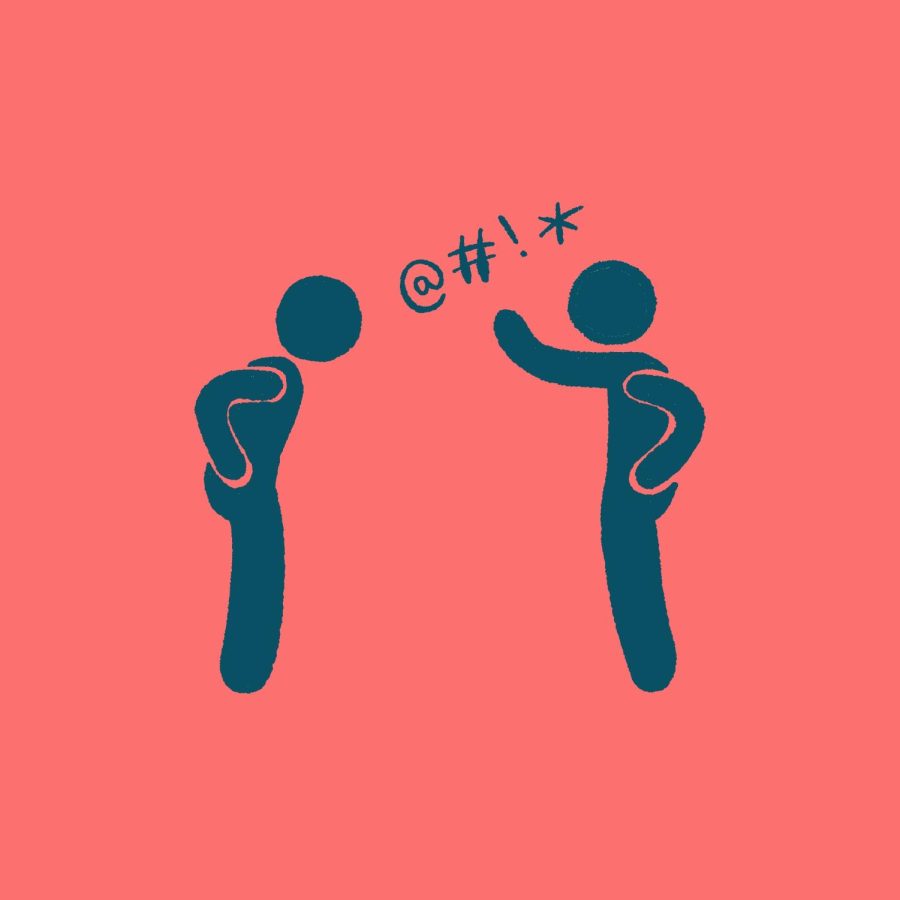Finding the Silver Lining in Rude Public Behavior
From confrontations at restaurants, refusals to wear masks, fights breaking out on airlines and classrooms, anger over vaccines, and disrespect towards school staff trying to do their jobs, there has been a noticeable spike in the lack of manners of people in public places. Unfortunately, Jesuit High School is no stranger to rude behavior.
Asked about incidents like booing at the Homecoming dance, Jesuit’s Director of Learning Support Colleen O’Mahony said that what we are seeing at Jesuit is no different from what all of society is experiencing coming out of lockdown.
“Some of us have forgotten how to be around other people as we’ve been around other people less,” O’Mahony said. “Communities set norms together, so when you’re not in a community, you’re not setting norms. Those two things have combined to create groups of people who don’t know how to act in acceptable ways.”
When asked about how to respond to people’s rude behavior, Principal of Jesuit High School Paul Hogan not only attributes Covid as a factor for people’s unmannerly behavior, but the internet and poor role modeling from national media.
“I think [people being ruder] is a legitimate problem coming out of the divisiveness connected to Covid,” Hogan said. “But also because our national dialogue has become much coarser. While 98 percent of our parents, students, and faculty are very polite, in the last 18 months I have received some of the most surprisingly unmannerly emails about vaccines and masks.”
Added Hogan: “We are in a divisive age, we have a massive public health crisis, and people are on different sides. I don’t think it helps that we have politicians and other public figures who’ve used very coarse language and are willing to be publicly rude and insulting to others, because young people look to these people as role models.”
O’Mahony noted that, normally, school “is a process of acculturation where you have three classes [sophomores, juniors, seniors] who know just what to do, and one class [freshman] comes in from 80 different feeder schools, all with different norms, and they come in and they see how things are supposed to be and they set their behavior” accordingly.
“That’s broken right now because we have lots of people here who don’t know what the cultural norms are,” she said. “So, already we have a system where people who don’t know what it’s supposed to look like could be reverting to the way things were at their middle school or the way things were when we came back last spring which we know are a little different, or the way they wish things would be.”
O’Mahony added that there are many students who are grateful to be back in school, and are genuinely appreciative of other students and staff.
When students get frustrated about wearing masks, for example, it’s important to see the bigger picture, O’Mahony said.
“No one loves wearing masks, but it’s a state law,” she said. “People get frustrated and maybe a little belligerent [when reminded to wear a mask] so I try to remember that they aren’t angry at me, they’re just frustrated at what their teenage years look like.”
Most Jesuit students understand the reasoning behind legal and safety-based guidelines, and fix problems when asked, O’Mahony noted.
Bernard Golden, a psychologist and the author of Overcoming Destructive Anger, agreed in TIME magazine: “We’re going through a time where physiologically, people’s threat system is at a heightened level. This period of threat has been so long that it may have had a damaging effect on people’s mental health, which for many has then been further debilitated by isolation, loss of resources, the death of loved ones and reduced social support.”
At the recent Jesuit Homecoming, some students loudly voiced their displeasure when the music halted and they were told by administrators to abide by state law and spread out three feet so the dance wouldn’t get shut down.
“Another feature of our community that is different from every other year is that we don’t know each other as well,” said O’Mahony. “Normally, [at a dance] I can call people out by name because I know almost everybody.”
Hogan said that students are always free to express their views as long as they do so civilly, but they are “not free to be rude” about it.
“I think people of all ages feel like from behind the veil of anonymity they can be ruder,” he said. “There is not the same social feedback loop that you would get if you were just sitting outside at lunch and you were to speak extremely harshly or coarsely or to use racist, misogynistic, or homophobic language. People would typically correct you. But that doesn’t happen as much online.”
To model thoughtful listening and polite responses in response to poor behavior helps to not get caught up in the mutual attack, he said.
“[Attacking is what we [often] see modeled on TV or online. We know in pop culture, there are some provocateurs trying to get people’s attention. I think if you’ve noticed what’s happened in school board meetings across the nation, [the rudeness] wears on people.”
The anonymity of being increasingly online during the pandemic made communicating in person more difficult, said Larry Martinez, associate professor of industrial-organizational psychology and co-author of the study in Portland State University’s newspaper. “People are out of practice of not having to have difficult conversations. These spirals that we’re seeing might be stronger in a post-pandemic world.”
But, there’s a silver lining, said O’Mahony.
“People want things to get “back to normal” but that’s the one thing we can’t get without some time…but I don’t think it is a permanent situation,” she said. “I think it’s just something that involves practice and reiteration and I already think we’re getting better.
“We’re a community,” said O’Mahony, “and we really pride ourselves on our community so seeing us interact in a way that doesn’t feel right is jarring and upsetting. As we play sports together and go on retreats together, and as we get to be in shows together, we are breaking down anonymity and we become real people again and real people are harder to treat [in a rude] way.”
Hogan said the path toward civility is to call people out when they are rude, and for adults to be positive role models. “Our faculty does a really good job modeling appropriate behavior,” he said. “It’s in our handbook. That also comes from our mission as a Jesuit, Catholic school that believes all people are created in the image of God and are, therefore, deserving of dignity and respect.
“As a community we need to continue to have very high expectations and to hold students and faculty accountable and point out to people when they’re being rude,” Hogan added. “I’m hopeful that we can soon return to a little more comity in U.S. society, but I’m not persuaded that will happen any time soon.”

storytelling is at the forefront of his life, through seeking out new adventures and finding creative ways to describe the world around him. As a young kid, Gus was surrounded with art and
writing and never saw himself doing much of anything else. Through listening to his dad make up crazy stories about made up characters, to walking around OHSU and sitting through
interviews of dental students with his mom, storytelling was always there. This will be Gus’s second year as an editor and writer for the Jesuit Chronicle. In his first year as a Journalism
Student, he learned the fundamentals of Indesign as well as explored topics ranging from the Jesuit administrative policies to food writing. Gus enjoys writing opinions , sharing different
perspectives, and connecting people through stories. He hopes to continue discovering what he loves to write about as well as continue to put passion into his work to connect the Jesuit
community through stories and discussion. In his free time, Gus enjoys running, cooking, drawing, going on long walks, and being with family.



